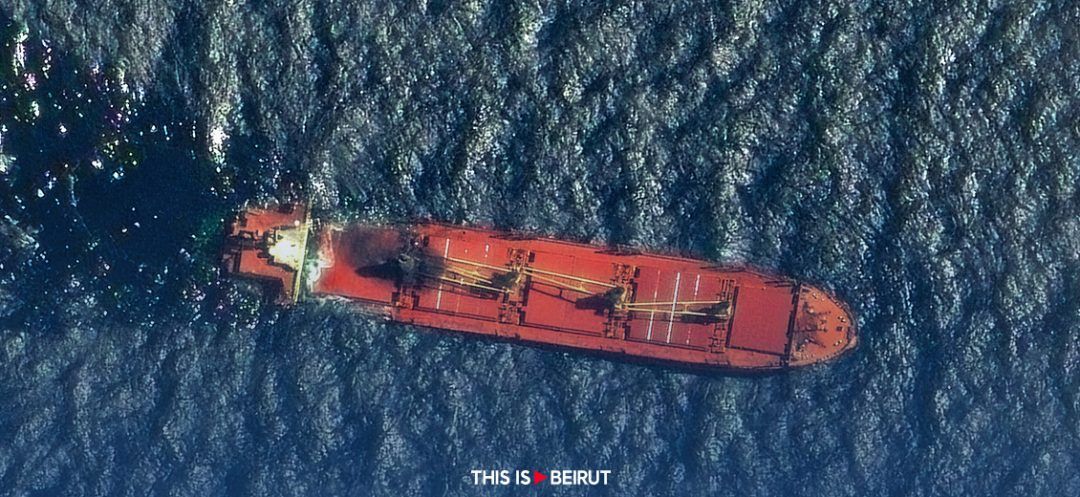- Home
- Middle East
- Lebanese Cargo Ship Damaged by Houthi Strike Sinks

©(Photo by Satellite image ©2024 Maxar Technologies / AFP)
A cargo ship loaded with fertiliser has sunk in the Gulf of Aden less than two weeks after it was damaged by missiles from Yemen's Houthi rebels, Yemen's government said Saturday.
The Houthis claimed the February 19 attack against the Rubymar, a cargo ship flying a Belizean flag and operated by a Lebanese firm, which transported combustible fertilisers.
The crew abandoned the ship and evacuated to safety after it was hit by two missiles.
The vessel had departed the United Arab Emirates and was bound for the Bulgarian port of Varna.
"The MV Rubymar sank last night, coinciding with weather factors and strong winds at sea," said a crisis cell of Yemen's internationally recognised government in charge of the case.
Roy Khoury, chief executive of the ship's operator Blue Fleet, said he was unaware of the sinking.
"We have nobody on board to check if it's true or not," he told AFP.
Fuel oil appeared to be leaking from the vessel in satellite images shared by Maxar Technologies and published by AFP.
The TankerTrackers website said the sinking would "cause an environmental catastrophe in the (Yemeni) territorial waters and in the Red Sea".
"A spill of ammonium nitrate fertiliser in the sea could have several significant impacts on marine ecosystems," said Julien Jreissati, programme director for Greenpeace in the Middle East and North Africa.
The maritime security agency UKMTO, run by the British navy, said the Rubymar had been 35 nautical miles (65 kilometres) from the Yemeni port of Mokha when its crew was forced to abandon it.
The Rubymar was identified as British-registered by the US military and security firm Ambrey, but Khoury has denied that information.
Since November, the Houthis have been carrying out attacks on ships linked to Israel in the Red Sea and the Gulf of Aden, saying they are acting in solidarity with Palestinians in the Gaza Strip.
With AFP
The Houthis claimed the February 19 attack against the Rubymar, a cargo ship flying a Belizean flag and operated by a Lebanese firm, which transported combustible fertilisers.
The crew abandoned the ship and evacuated to safety after it was hit by two missiles.
The vessel had departed the United Arab Emirates and was bound for the Bulgarian port of Varna.
"The MV Rubymar sank last night, coinciding with weather factors and strong winds at sea," said a crisis cell of Yemen's internationally recognised government in charge of the case.
Roy Khoury, chief executive of the ship's operator Blue Fleet, said he was unaware of the sinking.
"We have nobody on board to check if it's true or not," he told AFP.
Fuel oil appeared to be leaking from the vessel in satellite images shared by Maxar Technologies and published by AFP.
The TankerTrackers website said the sinking would "cause an environmental catastrophe in the (Yemeni) territorial waters and in the Red Sea".
"A spill of ammonium nitrate fertiliser in the sea could have several significant impacts on marine ecosystems," said Julien Jreissati, programme director for Greenpeace in the Middle East and North Africa.
The maritime security agency UKMTO, run by the British navy, said the Rubymar had been 35 nautical miles (65 kilometres) from the Yemeni port of Mokha when its crew was forced to abandon it.
The Rubymar was identified as British-registered by the US military and security firm Ambrey, but Khoury has denied that information.
Since November, the Houthis have been carrying out attacks on ships linked to Israel in the Red Sea and the Gulf of Aden, saying they are acting in solidarity with Palestinians in the Gaza Strip.
With AFP
Read more




Comments